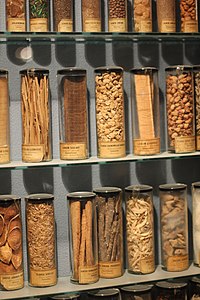
Photo from wikipedia
Abstract Background: The unique extract of a mixture of Baptisiae tinctoriae radix, Echinaceae pallidae/purpureae radix and Thujae occidentalis herba alleviates the typical symptoms of the common cold and shortens the… Click to show full abstract
Abstract Background: The unique extract of a mixture of Baptisiae tinctoriae radix, Echinaceae pallidae/purpureae radix and Thujae occidentalis herba alleviates the typical symptoms of the common cold and shortens the duration of the disease. Purpose: The risk-benefit ratio of a concentrated formulation of this herbal extract was investigated under everyday conditions. Study design: Pharmacy-based, non-interventional, multicenter, open, uncontrolled study registered at DRKS00011068. Methods: For 10 days, patients completed a diary questionnaire rating the severity of each common cold symptom on a 10-point scale. For evaluation, symptoms were combined into the scores “overall severity”, “rhinitis”, “bronchitis” and “general symptoms”. Cox models were used to evaluate the influence of covariates on the time of stable improvement. Results: In total 955 patients (12 to 90 years) were analyzed; 85% assessed the efficacy as good or very good. Response (improvement of the overall severity by at least 50%) was reached at median day 5 (95% CImedian 5-5). General symptoms abated faster than the other complaints. The percentage of predominantly moderate or severe symptoms to predominantly mild or absent symptoms reversed on day 3.9 (interpolation). Results of adolescents and adults did not differ (p = .6013; HR = 0.918). Concomitant medication did not boost the effect of the herbal remedy. Early start of treatment of the cold accelerated the recovery (p = .0486; HR = 0.814). Thirty-four cases of adverse events were self-recorded in the diaries; none of them were serious. The tolerability was assessed as “good or very good” by 98% of the patients. Conclusion: The benefit–risk assessment of this herbal extract clearly remains positive. This non-interventional study accords with and shows transferability of the results of previous placebo-controlled studies with this extract in a real-life setting. Trial registration: German Clinical Trials Register identifier: DRKS00011068.
Journal Title: Current Medical Research and Opinion
Year Published: 2019
Link to full text (if available)
Share on Social Media: Sign Up to like & get
recommendations!